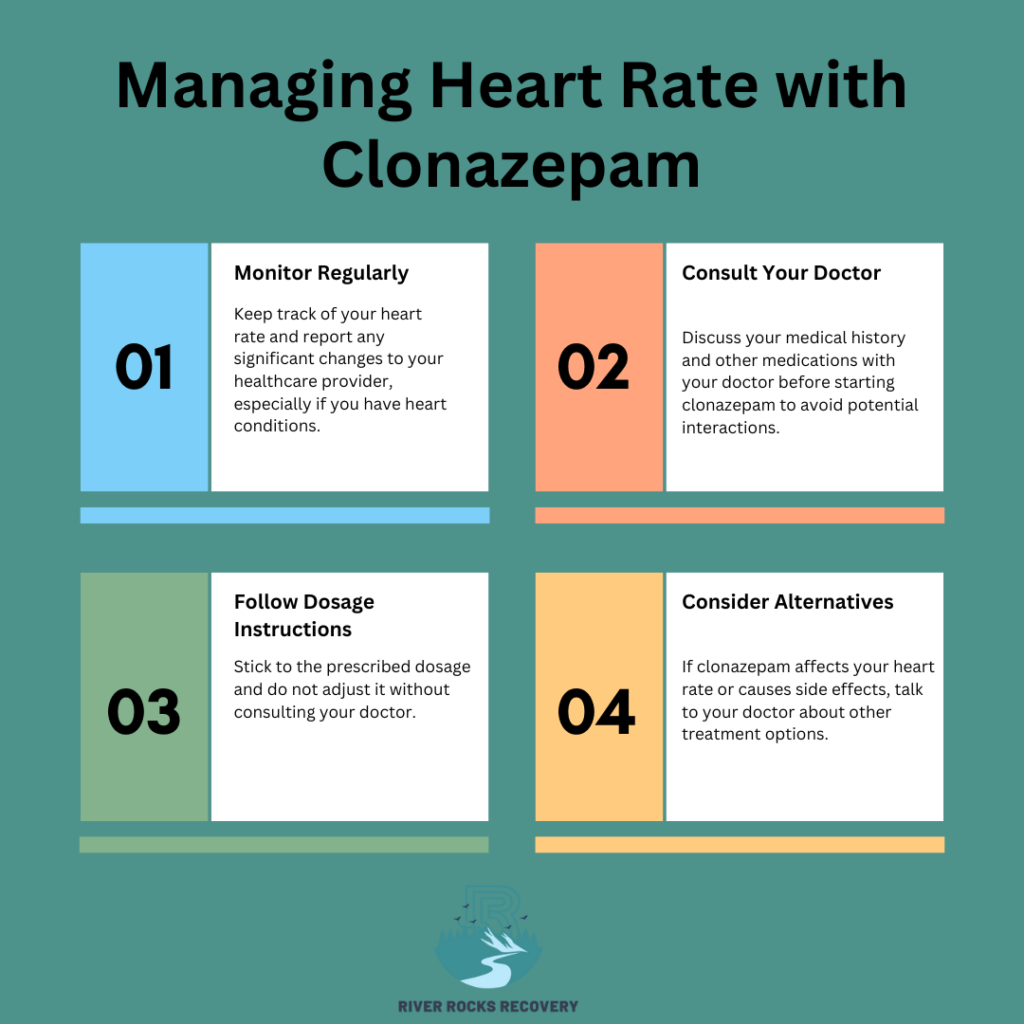Clonazepam is a widely used medicine to treat anxiety disorders, seizures, and panic attacks. Nowadays a number of patients are using it to live stress-free. But, as a regular user, it is critical to understand its effects on the body, particularly on heart rate.
So, in this article, we will understand the relationship between Clonazepam and heart rate, including the potential side effects, risks, and things you should know if you are taking this medication. Understanding how clonazepam affects heart rate and the associated risks is crucial, especially for those undergoing substance abuse treatment or participating in addiction therapy programs.
Without wasting seconds, let’s jump in!
How does Clonazepam work?
Before understanding the effects, it is critical to learn how Clonazepam works on the body. When you consume clonazepam to relax anxiety, it immediately works on nerve cells to reduce abnormal electrical activity in the brain. Experts surmise that it acts by tightly binding to the GABA-benzodiazepine receptor, which increases the affinity for GABA, a neurotransmitter that stops impulses between brain cells.
Nevertheless, a low level of GABA has been connected to pain, mood disorders, anxiety, and seizure disorders. However, it affects heart rate and causes a serious threat to the patients.
How does Clonazepam affect the heart rate?
Clonazepam works by increasing the neurotransmitter gamma-aminobutyric acid (GABA), which helps control how the body reacts to stress and anxiety. This may result in feelings of peace and relaxation, but it may also have an impact on heart rate. However, depending on the individual’s health, dosage, and how the body responds to the medication can vary the effects. According to studies, the most common effects are decreased and increased heart rate which can lead to dizziness, fainting, and anxiety.
- Temporary Decrease: Clonazepam can cause a temporary reduction in heart rate due to its sedative effects. By calming the CNS, it can slow down the overall physiological activity, including the heart.
- Reduced Anxiety-Induced Spikes: For individuals who experience anxiety-induced spikes in heart rate, clonazepam may help by reducing anxiety and promoting a more stable heart rate. However, this effect is more about managing anxiety rather than directly influencing heart rate.
Health Risks Associated with Clonazepam
Despite being a useful medication, there are significant risks associated with its effects on heart rate, such as:
-
Cardiovascular Health
People who already have heart problems should use clonazepam with caution since large heart rate swings can make some cardiovascular problems worse. For instance, a sharp decrease in heart rate may cause lightheadedness, syncope, or in severe situations, heart failure.
-
Dependency and Withdrawal
Long usage of clonazepam may result in physical dependence. Anxiety, elevated heart rate, and other cardiovascular problems are possible withdrawal symptoms. To reduce these effects, gradual weaning under physician supervision is advised.
-
Interaction with Other Drugs
Medication used to treat heart issues, as well as other drugs, may interact with clonazepam. It is crucial to let your healthcare professional know about all of the medications you take because these interactions have the potential to either worsen or lessen the impact on heart rate.
Potential Risks of Clonazepam on Heart Rate
While clonazepam may have some impact on heart rate, it’s important to be aware of the potential risks and side effects associated with its use:
- Risk of Bradycardia: Clonazepam can lead to bradycardia, or an unusually slow heart rate, in some individuals. Bradycardia can cause symptoms such as dizziness, fatigue, and shortness of breath, and may require medical attention if severe.
- Interactions with Cardiovascular Medications: Clonazepam may interact with other medications used to manage heart conditions, potentially altering their effectiveness or increasing the risk of adverse effects. It’s important to consult with a healthcare provider before combining clonazepam with cardiovascular drugs.
- Dependence and Withdrawal: Prolonged use of clonazepam can lead to physical dependence. Discontinuing the medication abruptly can cause withdrawal symptoms, which might include fluctuations in heart rate and other cardiovascular symptoms.
- Exacerbation of Existing Conditions: For individuals with pre-existing heart conditions, clonazepam may exacerbate issues like low blood pressure or heart rhythm disturbances. Regular monitoring and medical supervision are necessary to manage these risks effectively.
Managing Heart Rate with Clonazepam
If you are prescribed clonazepam and are concerned about its effects on your heart rate, here are some tips for managing potential risks:
- Regular Monitoring: Regularly monitor your heart rate and report any significant changes or symptoms to your healthcare provider. This is especially important if you have pre-existing heart conditions or are taking other medications.
- Consult Your Doctor: Always discuss your full medical history and any other medications you are taking with your healthcare provider before starting clonazepam. They can help ensure that the medication is appropriate for you and that potential interactions are managed.
- Adhere to Prescribed Dosages: Follow your doctor’s instructions carefully regarding dosage and administration. Do not alter the dosage or frequency of clonazepam without consulting your healthcare provider.
- Explore Alternative Therapies: If clonazepam is causing problematic changes in your heart rate or other side effects, discuss alternative therapies with your healthcare provider. There may be other medications or non-pharmacological treatments that can better manage your symptoms without affecting your heart rate.
Things You Should Know Before Taking Clonazepam
Now that you have understood the effects of Clonazepam on the heart, it’s time to consider the important things you should keep in mind before taking Clonazepam as your regular health supplement.
- Clonazepam should only be used under close medical supervision if you have a history of heart disease, arrhythmias, or other cardiovascular problems. It is crucial to regularly evaluate heart rate and cardiovascular health in general.
- Clonazepam’s sedative effects can cause dramatic heart rate shifts and an increased risk of falls or fainting, which are more likely to affect the elderly.
- People with sleep apnea should use clonazepam with caution as it can worsen the disease and indirectly alter heart rate. This is because the medicine can further impair respiratory function.
Are you Clonazepam addicted? Call Rivers Rock Recovery!
Clonazepam is a powerful medicine that can have a wide range of effects, including changes in heart rate. But if you feel you are becoming addicted to it or experiencing anxiety without taking its dose call Rivers Rock Recovery at (888) 905-6281! We provide several addiction therapy programs, including cognitive behavioral therapy and dialectical therapy. For those in more intensive programs, including partial hospitalization programs, it is crucial to address all aspects of health, including managing any effects of clonazepam on heart rate. Our experienced team will help you get rid of addiction and live your life happily and healthily. Contact us today and find the best addiction treatment option for you.
FAQs: Clonazepam and Heart Rate
Can Clonazepam affect heart rate?
Yes, Clonazepam can affect heart rate. It can cause both a decrease (bradycardia) or an increase (tachycardia) in heart rate.
When should I consult a doctor about Clonazepam and heart rate?
If you experience any unusual changes in your heart rate while taking Clonazepam, it’s important to consult with your doctor. They can assess your individual situation and determine if any adjustments are necessary.
Can my doctor prescribe a different medication if I experience adverse heart rate effects while taking Clonazepam?
Yes, your doctor may be able to prescribe a different medication to manage your anxiety or seizures without affecting your heart rate.
Can I stop taking Clonazepam abruptly?
No, you should not stop taking Clonazepam abruptly. Doing so can cause withdrawal symptoms, which can be severe. If you need to stop taking Clonazepam, your doctor will gradually taper off your dosage to minimize withdrawal effects.





























